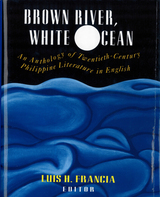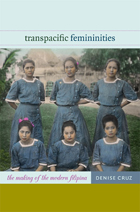2 books about Philippine literature (English)

Brown River, White Ocean
An Anthology of Twentieth-Century Philippine Literature in English
Francia, Luis H
Rutgers University Press, 1993
English is often a primary literary language for Filipino writers--not only for those in the Philippines but for those resident in the US; both groups are included in this anthology of 31 stories and 108 poems documenting a tradition that began at the turn-of-the-century. Manila-born poet and writer Francia, an editor at the Village Voice, gathers and validates creative work that has had limited distribution not only here but in Asia. ``In the Philippine context, what is foreign and what is indigenous has always been a tricky and ultimately impossible subject,'' Francia writes in his introduction. ``Filipinos have unconsciously perfected the art of mixing the two up....'' Readers who expect Filipino English to have the unexpected inflections and inventiveness of Indian or Caribbean English will be disappointed: the Filipino writer uses standard American English as a native language, but spices it naturally with words form indigenous and adopted tongues: Tagalog, Spanish, Ilokano, etc. Stories look at unrequited passion (in which the sensual tropical ambiance is at odds with society's rules); village life; the different cultures that have settled in the archipelago--Chinese, Japanese, Spanish, Hindu Indian; and the consequences of military, colonial, and economic occupation. Both poems and stories consider the experience of Filipinos--some intellectual, some humble--in the US. Among the more familiar contributors: Carlos Bulosan, Jos‚ Garc¡a Villa, Jessica Hagedorn, and Ninotchka Rosca. While the prose selected here is more consistent in quality than the poetry, the poems seem more wide-ranging; like the fiction writers, the poets consider love, politics, and metaphysics but move as well into experimentation and the modernist realm. A satisfying and worthwhile project.
[more]

Transpacific Femininities
The Making of the Modern Filipina
Denise Cruz
Duke University Press, 2012
In this groundbreaking study, Denise Cruz investigates the importance of the figure she terms the "transpacific Filipina" to Philippine nationalism, women's suffrage, and constructions of modernity. Her analysis illuminates connections between the rise in the number of Philippine works produced in English and the emergence of new social classes of transpacific women during the early to mid-twentieth century.
Through a careful study of multiple texts produced by Filipina and Filipino writers in the Philippines and the United States—including novels and short stories, newspaper and magazine articles, conduct manuals, and editorial cartoons—Cruz provides a new archive and fresh perspectives for understanding Philippine literature and culture. She demonstrates that the modern Filipina did not emerge as a simple byproduct of American and Spanish colonial regimes, but rather was the result of political, economic, and cultural interactions among the Philippines, Spain, the United States, and Japan. Cruz shows how the complex interplay of feminism, nationalism, empire, and modernity helped to shape, and were shaped by, conceptions of the transpacific Filipina.
Through a careful study of multiple texts produced by Filipina and Filipino writers in the Philippines and the United States—including novels and short stories, newspaper and magazine articles, conduct manuals, and editorial cartoons—Cruz provides a new archive and fresh perspectives for understanding Philippine literature and culture. She demonstrates that the modern Filipina did not emerge as a simple byproduct of American and Spanish colonial regimes, but rather was the result of political, economic, and cultural interactions among the Philippines, Spain, the United States, and Japan. Cruz shows how the complex interplay of feminism, nationalism, empire, and modernity helped to shape, and were shaped by, conceptions of the transpacific Filipina.
[more]
READERS
Browse our collection.
PUBLISHERS
See BiblioVault's publisher services.
STUDENT SERVICES
Files for college accessibility offices.
UChicago Accessibility Resources
home | accessibility | search | about | contact us
BiblioVault ® 2001 - 2024
The University of Chicago Press









